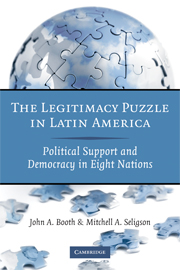Book contents
- Frontmatter
- Contents
- List of Figures
- List of Tables
- Preface
- 1 The Legitimacy Puzzles
- 2 The Structure of Legitimacy
- 3 Countries in the Study
- 4 The Sources of Political Legitimacy
- 5 Legitimacy and Political Participation
- 6 Legitimacy and Negative Political Capital
- 7 Legitimacy and Democratic Values
- 8 The Sky Is Not Falling: The Puzzle Solved
- Appendix A Supporting Data and Analyses for Chapters 1–5
- Appendix B Variables Used in the Analyses
- Appendix C System-level Performance Measures
- Appendix D Nonsampling Errors, Sampling Errors, and Design Effects for the Eight-Nation Survey
- Appendix E Method of Constructing the Legitimacy Factor Scores
- References
- About the Authors
- Index
6 - Legitimacy and Negative Political Capital
Published online by Cambridge University Press: 05 June 2012
- Frontmatter
- Contents
- List of Figures
- List of Tables
- Preface
- 1 The Legitimacy Puzzles
- 2 The Structure of Legitimacy
- 3 Countries in the Study
- 4 The Sources of Political Legitimacy
- 5 Legitimacy and Political Participation
- 6 Legitimacy and Negative Political Capital
- 7 Legitimacy and Democratic Values
- 8 The Sky Is Not Falling: The Puzzle Solved
- Appendix A Supporting Data and Analyses for Chapters 1–5
- Appendix B Variables Used in the Analyses
- Appendix C System-level Performance Measures
- Appendix D Nonsampling Errors, Sampling Errors, and Design Effects for the Eight-Nation Survey
- Appendix E Method of Constructing the Legitimacy Factor Scores
- References
- About the Authors
- Index
Summary
We began this book by citing scholarship demonstrating that the United States and other established democracies have experienced a marked decline of the legitimacy of democratic institutions in recent decades. Many have asserted that low levels of key components of legitimacy (especially trust in institutions) would necessarily undermine or weaken democratic regimes. Yet, we also noted that very few democracies have failed despite low (and declining) legitimacy. We have identified this disjuncture between expected system-level consequences and low levels of legitimacy as part of the legitimacy effects puzzle. Why do predictions from such an important theory fall so wide of their mark?
In Chapter 5 we sought answers to the effects puzzle at the microlevel by exploring how legitimacy affects political participation. Treating participation as a form of political capital linking citizens to regimes by conveying demands and preferences, we encountered a pattern quite contrary to expectations from the literature. Disaffected citizens of our eight Latin American democracies do not drop out of conventional, within-system forms of participation but instead participate more than those of middling legitimacy levels and rather similarly to the most-supportive citizens. This gave us a partial answer to the effects puzzle: Democracies may not break down when legitimacy declines because most disaffected citizens do not disengage from within-system participation or attack the system. Rather, most disgruntled citizens engage the political system in diverse ways. Most such participation poses no threat to the institutional order and may actually reinforce or take pressure off national institutions.
- Type
- Chapter
- Information
- The Legitimacy Puzzle in Latin AmericaPolitical Support and Democracy in Eight Nations, pp. 177 - 200Publisher: Cambridge University PressPrint publication year: 2009



